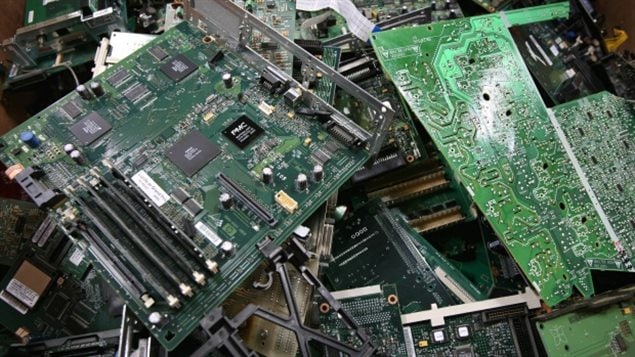Almost 42 million tonnes of electric and electronic waste was dumped around the world last year. The news comes from a UN study released on Sunday by the United Nations University
The report is called The Global E-waste Monitor 2014: Quantities, Flows and Resources
E-waste is considered to be any object with an electric cord or operating with a battery, from hair dryers, toasters and refridgerators to mobile phones, TV’s and computers.

The United States led total amount e-waste dumping with 7.1 million tonnes in 2014, ahead of China on 6 million and followed by Japan, Germany and India, it said. Canada ranks lower on the list, in 15th place, with a dump of 725,000 tonnes.
However on a per capita basis, Norway led waste generation, with 28.3 kg dumped per inhabitant, followed by Switzerland, Iceland, Denmark and Britain
In addition to the toxic aspect of the variety of chemicals from such objects leeching into the environment, David Malone, the UN under secretary general and rector of the United Nations University said, materials such as gold, copper, silver and iron being thrown out had a recoverable value of about $52 billion. The approximately 300 tonnes of gold in the waste was alone estimated to be worth $11.2 billion.
The report said about 60 percent of the waste was from things such as vacuum cleaners, electric shavers, video cameras, and even solar panels. Mobile phones, personal computers, printers etc made up about 7 percent.
In addition to toxic materials like lead, mercury, cadmium, beryllium and others which are neurotoxins and can cause kidney and liver damage, the report said about 4,400 tonnes of ozone-depleting materials are released from the growing mountains of e-waste in landfills or otherwise dumped in the environment, with only a small proportion of total waste being properly recycled.
It also predicted that the situation was only get worse due to rising sales and shorter lifetimes of electronic equipment. It said e-waste volume would likely rise some 20% to 50 million tonnes by 2018.
With files from Thompson Reuters, CBC







For reasons beyond our control, and for an undetermined period of time, our comment section is now closed. However, our social networks remain open to your contributions.